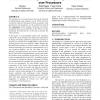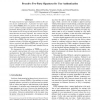1792 search results - page 329 / 359 » What Are We Arguing About |
FPGA
2004
ACM
14 years 1 months ago
2004
ACM
The speedup over a microprocessor that can be achieved by implementing some programs on an FPGA has been extensively reported. This paper presents an analysis, both quantitative a...
TCC
2004
Springer
14 years 1 months ago
2004
Springer
Quantum 2-party cryptography differs from its classical counterpart in at least one important way: Given blak-box access to a perfect commitment scheme there exists a secure 1−2...
NDSS
2003
IEEE
14 years 29 days ago
2003
IEEE
We study proactive two-party signature schemes in the context of user authentication. A proactive two-party signature scheme (P2SS) allows two parties—the client and the server�...
MPC
2010
Springer
13 years 11 months ago
2010
Springer
cting programs and point-free abstraction [2]. In order to automatically generate the fast running code there was the need to use matrix product as the basic matrix composition ope...
CRYPTO
2008
Springer
13 years 9 months ago
2008
Springer
In cryptography, there has been tremendous success in building various two-party protocols with small communication complexity out of homomorphic semantically-secure encryption sc...


